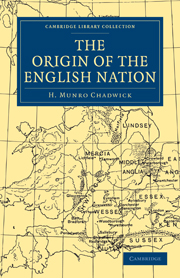Book contents
- Frontmatter
- PREFACE
- Contents
- CHAPTER I ENGLAND IN THE SIXTH CENTURY
- CHAPTER II THE WEST SAXON INVASION
- CHAPTER III THE INVASION OF KENT
- CHAPTER IV THE SAXONS, ANGLES AND JUTES IN BRITAIN
- CHAPTER V THE SAXONS, ANGLES AND JUTES ON THE CONTINENT
- CHAPTER VI THE KINGS OF ANGEL
- NOTE. THE EARLY KINGS OF THE DANES
- CHAPTER VII THE AGE OF NATIONAL MIGRATIONS
- CHAPTER VIII THE SAXONS AND ANGLES IN ROMAN TIMES
- CHAPTER IX THE CLASSIFICATION OF THE ANCIENT GERMANI
- CHAPTER X THE CULT OF NERTHUS
- CHAPTER XI KING AETHELWULF'S MYTHICAL ANCESTORS
- CHAPTER XII SOCIAL CONDITIONS OF THE ROMAN PERIOD
- ADDENDA
- INDEX
- Plate section
CHAPTER VII - THE AGE OF NATIONAL MIGRATIONS
Published online by Cambridge University Press: 07 September 2010
- Frontmatter
- PREFACE
- Contents
- CHAPTER I ENGLAND IN THE SIXTH CENTURY
- CHAPTER II THE WEST SAXON INVASION
- CHAPTER III THE INVASION OF KENT
- CHAPTER IV THE SAXONS, ANGLES AND JUTES IN BRITAIN
- CHAPTER V THE SAXONS, ANGLES AND JUTES ON THE CONTINENT
- CHAPTER VI THE KINGS OF ANGEL
- NOTE. THE EARLY KINGS OF THE DANES
- CHAPTER VII THE AGE OF NATIONAL MIGRATIONS
- CHAPTER VIII THE SAXONS AND ANGLES IN ROMAN TIMES
- CHAPTER IX THE CLASSIFICATION OF THE ANCIENT GERMANI
- CHAPTER X THE CULT OF NERTHUS
- CHAPTER XI KING AETHELWULF'S MYTHICAL ANCESTORS
- CHAPTER XII SOCIAL CONDITIONS OF THE ROMAN PERIOD
- ADDENDA
- INDEX
- Plate section
Summary
Now that we have been able to form some idea as to the situation of the home of the Angli in the centuries immediately preceding the invasion of Britain, it will be convenient to consider briefly the evidence for social and political organisation during the period in question in order that we may obtain a better understanding of the conditions under which the invasion took place. Of course it is quite impossible in such a work as the present to attempt anything like a thorough investigation of this subject. All that we can do here is to endeavour to ascertain a few of the more distinctive features which characterised the society of the period.
For such an investigation our best guidance is clearly to be found in native poems and traditions which refer to the age of the invasion. These however may be supplemented from the far richer stock of early Scandinavian tradition; for it is clear from Beowulf and Widsith that the Angli were in intimate communication with the peoples of the Baltic. Such evidence is certainly to be preferred to the statements of Tacitus and other early Roman writers on the ancient Germani. In the first place the information furnished by the latter was obtained, not at the time of the invasion of Britain but at a period several centuries earlier. Further, it is only natural to suppose that these statements refer primarily to the Teutonic nations, on the Rhine and Danube, with which the Romans themselves came in contact.
- Type
- Chapter
- Information
- The Origin of the English Nation , pp. 144 - 180Publisher: Cambridge University PressPrint publication year: 2010First published in: 1924



